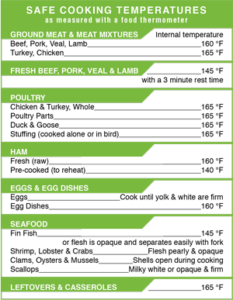Independence Day is a time to celebrate our country with family and friends. July 4th is synonymous with fireworks, swimming and picnics. However, the fun of picnic and barbeque season can also bring on additional opportunities for foodborne bacteria to thrive, resulting in severe sickness or even death. Don’t be known as the host of the, “Bacteria BBQ” by following these rules and tips.
Transport Food Safely
Cold foods should be stored at or below 40°F to prevent bacteria from growing. It is important to keep coolers closed as much as possible to keep their contents from warm outdoor air temperatures. Cross-contamination should always be avoided at all costs. Raw meat, poultry and seafood should be securely wrapped and kept separate from foods that are eaten raw such as salads, fruits and vegetables.
Clean all your produce before you transport, including fruits and vegetables. Packaged fruits and vegetables that are labeled “ready-to-eat”, “washed,” or “triple washed” do not need to be washed.
Tip: Keep a cooler reserved for beverages separate from perishable foods. This way when your guests replenish their beverages they are not allowing warmer outside temperatures to come in contact with perishable foods.
Grill Safely
Don’t reuse platters or utensils unless you want to allow bacteria from your raw foods to spread to your cooked foods making you a Bacteria BBQ Host. Also, always marinate foods in the refrigerator. If you plan on using some of the marinate as a sauce for your cooked food, reserve extra ahead of time. Do not reuse the marinate your raw food was marinating in.
Additionally, cook foods thoroughly. Always bring a food thermometer and follow the guidelines in this food safety chart:

Remember an infrared thermometer is a great tool to check the cooking surface temperature of your grill or griddle. However, an infrared thermometer should never be used on food. For that, you should always use a thermometer with a probe like this one.
Check for foreign objects in food. If you clean your grill using a bristle brush, check to make sure that no detached bristles have made their way into grilled food.
Tip: Never reuse a plate or utensils that previously held raw meat, poultry, or seafood for serving. Use tools such as these grill prep trays. Don’t forget your thermometer.
Avoid the DANGER ZONE
Never let your picnic food remain in the “Danger Zone” — between 40 °F and 140 °F — for more than 2 hours, or 1 hour if outdoor temperatures are above 90 °F. This is when bacteria in food can multiply rapidly, and lead to foodborne





